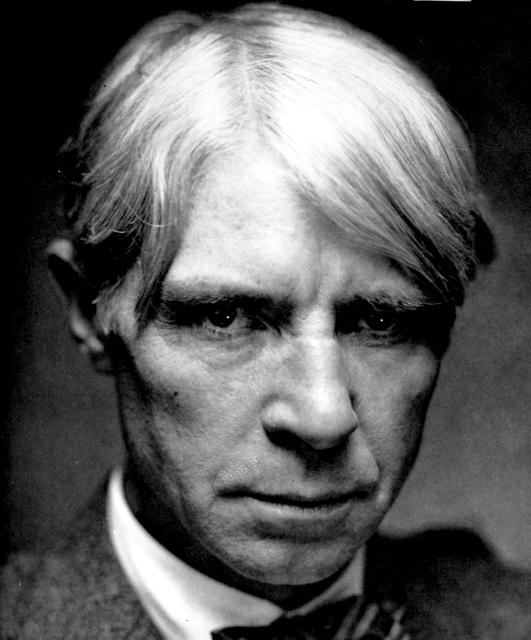“I always kind of knew I was going to make a film about Carl Sandburg — that’s the truth,” documentarian Paul Bonesteel tells Xpress about his latest project, The Day Carl Sandburg Died. “There’s a huge amount of satisfaction with this, partly because it’s been hanging over me for 25 years. And I don’t mean in an intimidating way. It’s just been there.”
For the past couple of decades, the idea of a film about the life and — maybe more importantly — the times of legendary poet Carl Sandburg was something that gestated with Bonesteel, but never quite came to fruition. “I thought about making a film then,” he says, thinking back to the late ‘80s and early ‘90s, when the idea first began to form. But limitations, both within the subject matter and in his own experience, kept Bonesteel back at the time. “It was too complicated, I didn’t think I was ready. I wasn’t ready to take on anything like that.”
A combination of things, however, made the nagging notion of this project a reality. Partly a matter of accrued experience as a filmmaker — including well-received documentaries like The Great American Quilt Revival (2005) and The Mystery of George Masa (2002) — the film also came into being a decade ago due to changes in the political climate. “In the early part of the 2000s, the way the world was headed — politically, socially — it really began to bug me,” Bonesteel says. “And I realized that Sandburg was a vehicle to address things that I felt people weren’t talking about and people didn’t have a historical perspective on. From art, to poetry, to expression, it just seemed like, ‘OK, now’s the time to fire this up and make this happen.’”
The result is a film that’s definitely political, but not overtly so; a movie that allows the audience to draw its own conclusions. “I like using historic figures to make relevant statements,” says Bonesteel. “I try to be true to Sandburg’s work, and in that is politics.”
Sandburg’s socialist politics are well documented, and even famously immortalized in his Chicago Poems — but for Bonesteel, focusing on that only illuminates one facet of a very complicated man. “I discovered, for myself, how much more activist and radical Sandburg was than I thought,” Bonesteel points out, while also noting that at the same time, there was more involved in Sandburg’s view of the world. “I think Sandburg’s politics are fairly centralist in its entirety. Some people would laugh at that. But with a bigger lens, he was really encouraging democracy in its most efficient use. He talked about the need to continually work towards a democracy. He’s really patriotic in that regard, in the classic sense of patriotism. He had a message and a purpose in what he was doing, and it was not anarchistic — it was to some degree propagandistic — but pro-American.”
But with The Day Carl Sandburg Died, Bonesteel is attempting to do more than just talk politics — he’s also attempting to expose people to a poet he’s admired since childhood, and a poet who, over the years, has fallen both in and out of favor with critics. “In his latter years, he was perceived as being sweet, kind of sentimental, and a little old school, especially as it hit the ‘60s and ‘70s. Change occurred. Sandburg’s now the underdog poet. He needs a second look,” says Bonesteel. “I felt it was more my obligation to expose people to it. I think that the substance is there and the film just scratches the surface.”
Unfortunately, Bonesteel’s desire to tell the story of Sandburg wasn’t any easy accomplishment, especially in the same economic climate that motivated the director in the first place. The totality of such an undertaking took work — and interviews with people like legendary folk singer Pete Seeger and radio personality Studs Terkel — pieced together over six long years.
For Bonesteel, the biggest hurdle wasn’t the effort needed o complete the film, but rather the uncertainty of its effect. “The hard part, honestly, is building a house you’re not sure anyone’s ever going to live in. In the background is this lurking question of futility. It’s terrifying to stare in the face and go, ‘Did I just spend six years of my life wasting my time?’”
But the justification to all that time, effort and pangs of doubt always came from his subject. “Sandburg always answered that question for me. I could always go to Sandburg, pick up a book, the biography or something, and I’d feel better about what I was doing.”
Now, after more than half a decade of toil, the film’s recent premiere at the RiverRun International Film Festival in Winston-Salem, and a couple of upcoming local screenings, Bonesteel can look forward to the less nerve-racking, more satisfactory aspects of filmmaking — presenting his work to an audience. “That’s the fun part. The lights go down and everyone’s there to see your movie. That’s what it’s all about.”
— Justin Souther can be reached at the.running.board@gmail.com.
who: The Day Carl Sandburg Died
what: Film premiere
where: Fine Arts Theatre
when: Thursday, Tuesday, May 3 (7 p.m., part of Asheville Wordfest. Q & A and reception to follow at YMI Drugstore, Market and Valley streets). Also May 7 (1 p.m. $10) Info at bonesteelfilms.com



Can’t wait to see it! I loved the George Masa film. It’s nice to know that a content-driven documentary filmmaker like Paul Bonesteel is working in our area.